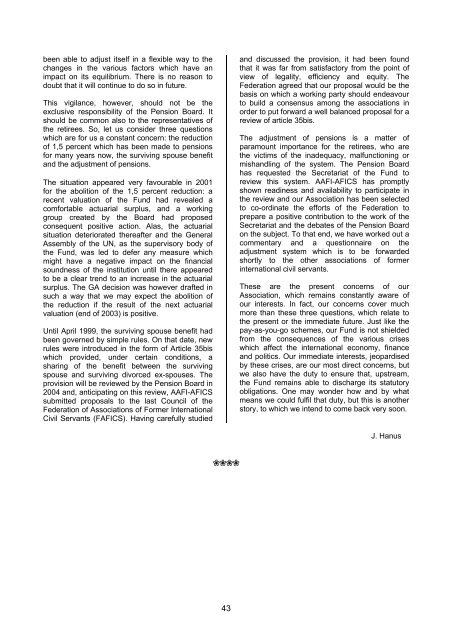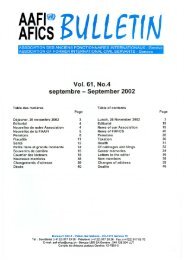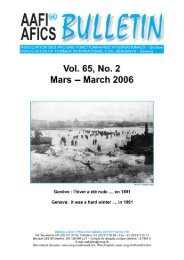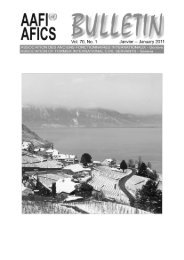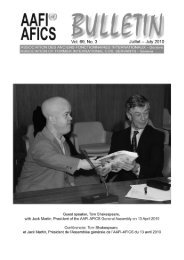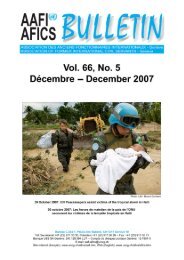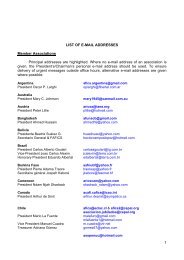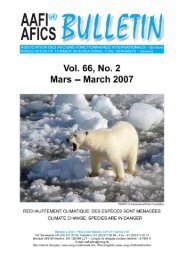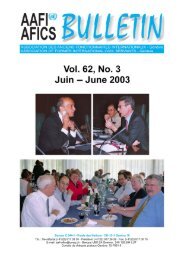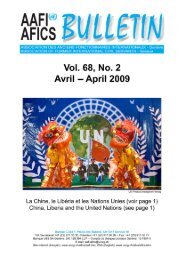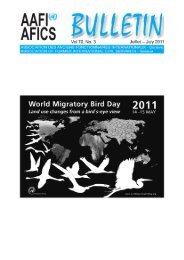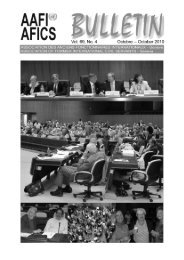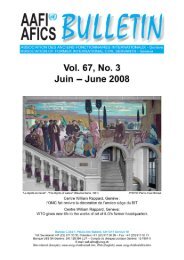nouvelles de notre association - aafi-afics - UNOG
nouvelles de notre association - aafi-afics - UNOG
nouvelles de notre association - aafi-afics - UNOG
Create successful ePaper yourself
Turn your PDF publications into a flip-book with our unique Google optimized e-Paper software.
een able to adjust itself in a flexible way to the<br />
changes in the various factors which have an<br />
impact on its equilibrium. There is no reason to<br />
doubt that it will continue to do so in future.<br />
This vigilance, however, should not be the<br />
exclusive responsibility of the Pension Board. It<br />
should be common also to the representatives of<br />
the retirees. So, let us consi<strong>de</strong>r three questions<br />
which are for us a constant concern: the reduction<br />
of 1,5 percent which has been ma<strong>de</strong> to pensions<br />
for many years now, the surviving spouse benefit<br />
and the adjustment of pensions.<br />
The situation appeared very favourable in 2001<br />
for the abolition of the 1,5 percent reduction: a<br />
recent valuation of the Fund had revealed a<br />
comfortable actuarial surplus, and a working<br />
group created by the Board had proposed<br />
consequent positive action. Alas, the actuarial<br />
situation <strong>de</strong>teriorated thereafter and the General<br />
Assembly of the UN, as the supervisory body of<br />
the Fund, was led to <strong>de</strong>fer any measure which<br />
might have a negative impact on the financial<br />
soundness of the institution until there appeared<br />
to be a clear trend to an increase in the actuarial<br />
surplus. The GA <strong>de</strong>cision was however drafted in<br />
such a way that we may expect the abolition of<br />
the reduction if the result of the next actuarial<br />
valuation (end of 2003) is positive.<br />
Until April 1999, the surviving spouse benefit had<br />
been governed by simple rules. On that date, new<br />
rules were introduced in the form of Article 35bis<br />
which provi<strong>de</strong>d, un<strong>de</strong>r certain conditions, a<br />
sharing of the benefit between the surviving<br />
spouse and surviving divorced ex-spouses. The<br />
provision will be reviewed by the Pension Board in<br />
2004 and, anticipating on this review, AAFI-AFICS<br />
submitted proposals to the last Council of the<br />
Fe<strong>de</strong>ration of Associations of Former International<br />
Civil Servants (FAFICS). Having carefully studied<br />
and discussed the provision, it had been found<br />
that it was far from satisfactory from the point of<br />
view of legality, efficiency and equity. The<br />
Fe<strong>de</strong>ration agreed that our proposal would be the<br />
basis on which a working party should en<strong>de</strong>avour<br />
to build a consensus among the <strong>association</strong>s in<br />
or<strong>de</strong>r to put forward a well balanced proposal for a<br />
review of article 35bis.<br />
The adjustment of pensions is a matter of<br />
paramount importance for the retirees, who are<br />
the victims of the ina<strong>de</strong>quacy, malfunctioning or<br />
mishandling of the system. The Pension Board<br />
has requested the Secretariat of the Fund to<br />
review this system. AAFI-AFICS has promptly<br />
shown readiness and availability to participate in<br />
the review and our Association has been selected<br />
to co-ordinate the efforts of the Fe<strong>de</strong>ration to<br />
prepare a positive contribution to the work of the<br />
Secretariat and the <strong>de</strong>bates of the Pension Board<br />
on the subject. To that end, we have worked out a<br />
commentary and a questionnaire on the<br />
adjustment system which is to be forwar<strong>de</strong>d<br />
shortly to the other <strong>association</strong>s of former<br />
international civil servants.<br />
These are the present concerns of our<br />
Association, which remains constantly aware of<br />
our interests. In fact, our concerns cover much<br />
more than these three questions, which relate to<br />
the present or the immediate future. Just like the<br />
pay-as-you-go schemes, our Fund is not shiel<strong>de</strong>d<br />
from the consequences of the various crises<br />
which affect the international economy, finance<br />
and politics. Our immediate interests, jeopardised<br />
by these crises, are our most direct concerns, but<br />
we also have the duty to ensure that, upstream,<br />
the Fund remains able to discharge its statutory<br />
obligations. One may won<strong>de</strong>r how and by what<br />
means we could fulfil that duty, but this is another<br />
story, to which we intend to come back very soon.<br />
J. Hanus<br />
<br />
43


